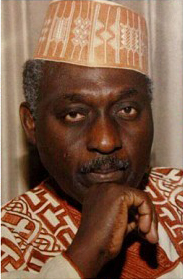 |
|
|
Literature Discussion - Lit-Talk.com
Kofi Awoor: Simplicity and Commitment
By Muli wa Kyendo
The best writers make friends and influence people. With his poetry, Kofi Awoonor, the Ghanaian poet achieved this feat and developed followers around the world. I am among those followers, having been introduced to his poetry as a student in secondary school in Nairobi. I was sure I wanted to write like him – using my people’s culture to make profound statements in simple, accessible language, imagery and idioms. It’s a goal I still strive to reach.
One poem stood out for me and my friend Dave Kimani, “Songs of Sorrow” (you can read it in Modern Poetry from Africa by Gerald Moore and Ulli Beier, two pioneering editors about whom every African writer can say much). My friend and I were intrigued by the following part of the poem – which I can still recite:
Indeed, Dzorgbese Lisa* has treated me thus
It has led me among the sharps of the forest
Returning is not possible
And going forward is a great difficulty
The affairs of this world are like the chameleon faeces
Into which I have stepped
when I clean it cannot go.
To us, as youths, this was not only a brilliant insight; it was a dramatic encapsulization of the brutality of life – the vicious trap in which humanity finds itself caught-up. Indeed, the affairs of this world are like the chameleon faeces into which we step. When we clean it cannot go. It was an imagery that any boy raised in rural Africa could understand. Henceforth, when faced with a dilemma; Dave and I would remind each other of the poem in a secret code understood only by the two of us. And we would laugh, as Dave would say, “Like an African.”
Later in life, I have found myself often quoting the poem to others and being frustrated that they couldn’t laugh like an African – loud and prolonged. Without knowing whence it came, perhaps they couldn’t understand the significance.
Another poem that had profound influence on us was “The Sea Eats the Land at Home.”
At home, the sea is in the town
Running in and out of the cooking places
Collecting the firewood from the hearths
And sending it back at night;
It came one day at the dead of night
Destroying the cement walls,
And carried away the fowls
The cooking pots and the ladles,
The sea eats the land at home,
It is a sad thing to hear the wails
And the mourning shouts of the women
Calling on all the gods they worship
To protect them from the angry sea.
Kofi was sadly among more than 69 people killed in Nairobi in a ghastly attack of a high-class shopping mall, the Westgate, by the Somali gunmen of the Al-Shabaab Islamists on September 21, 2013. He was in Nairobi at the invitation of a local writers group, Storymoja to participate in its Hay Festival and to impart some of his knowledge and skills to a new generation of writers.
And Kofi, who was 78 at the time of his death, was apparently thrilled with the results of the work he had so far done at the Festival because he was quoted as saying that the four day event was “the best representation of Ghanaian authors that we have ever had.”
A fellow Ghanaian poet who was also at the event, Nii Parkes said “I waited my whole life to meet my uncle, Kofi Awoonor, and two days later he is gone.” And another Ghanaian also at the event, Kwame Dawes, said “Kofi Awoonor's death is a sad, sad moment here in Nairobi. We have lost one of the greatest African poets and diplomats. I've lost my uncle.”
In a statement the organizers of the even said: “We were honoured to be graced by his appearance at Storymoja Hay Festival, and deeply humbled by his desire to impart knowledge to the young festival audience. Professor Awoonor was one of Africa's greatest voices and poets and will forever remain a beacon of knowledge and strength and hope.” The Festival was brought to an end on Saturday evening "in sympathy with those who have lost their lives or were injured" and for the safety of attendees.
Kofi’s best known publications include Rediscovery, a volume of poetry and this This Earth, My Brother. That his death dominated news all over the world is a clear testimony of the amount of people he had made friends with and influenced through in writing.
*Fate

Kofi Awoonor